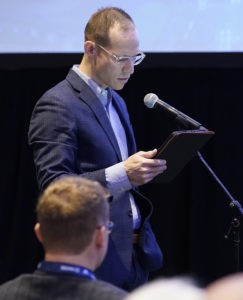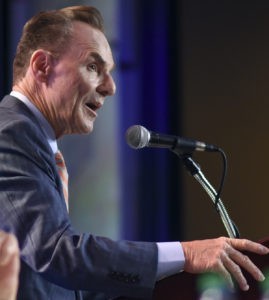For the second time in a week, members of the Southern Baptist Convention’s Executive Committee have defied the will of the SBC in annual session — previously considered the final authority in governance — by refusing to waive attorney-client privilege in an investigation into possible sexual abuse in the denomination.
The Sept. 28 failure of the Executive Committee for a second time to resolve a disagreement with the SBC’s Sexual Abuse Task Force puts the denomination’s congregational form of governance in peril. By refusing to do what messengers to the convention in annual session have asked, the Executive Committee upends the bottom-up governance model that has been a hallmark of Baptist life from its beginnings.

Jared Wellman, pastor at Tate Springs Baptist Church in Arlington, Texas, presents a motion during the Executive Committee meeting Monday, June 14, 2021, in Nashville, Tenn. Wellman’s motion called for an independent committee to lead a probe of the denomination’s handling of sex abuse cases. (AP Photo/Mark Humphrey)
Jared Wellman, an Executive Committee member who made a failed motion during the five-hour Sept. 28 called meeting of the committee — held on Zoom and livestreamed — to follow the will of the convention tweeted: “A historic moment in the SBC as the EC has chosen to defy the messengers in an investigation concerning themselves.”
Wellman has been at the forefront of calling for an independent investigation, speaking at previous meetings as well, ultimately leading to the action taken by the convention in session.
The investigation in question is not just about the SBC in general but about the Executive Committee and its staff specifically. In June, SBC annual convention messengers rebuked an attempt by the Executive Committee to investigate itself apart from convention oversight, resulting in the appointment of the Sexual Abuse Task Force, which will report directly to the convention when it meets next June in Anaheim, Calif.
Wellman’s motion to waive attorney-client privilege in the sexual abuse investigation — as requested by convention messengers and the third-party firm doing the investigation — lost by a narrower margin this week than a similar motion at last week’s regular in-person meeting. This time, the vote was 35-40 against waiving privilege; last week, a similar motion failed 55-20.
Out of patience
Members of the Sexual Abuse Task Force have demonstrated that they are out of patience with the Executive Committee and will move ahead without their cooperation.
The Sept. 28 called meeting happened after members of the task force and officers of the Executive Committee held intensive private talks the day before, Sept. 27. Shortly before the full committee meeting, task force Chairman Bruce Frank released a letter explaining that those talks had failed to find a way forward.
He and the task force outlined three possible options, none of which were found acceptable by Executive Committee officers and the Executive Committee’s attorneys.
Critics of the Executive Committee’s actions have started pointing fingers at the advice being given by the committee’s attorneys. Exactly what advice has been given is not publicly known, because every time the committee hears from legal counsel, the body goes into executive session.
In addition to the Nashville firm of Guenther, Jordan and Price — which has represented both the Executive Committee and the SBC in session for decades — the Executive Committee recently added another group of lawyers specifically to advise on the sexual abuse investigation. That second firm, Locke Lord, is based in Dallas.
“We do not believe the new EC lawyers were acting in good faith or good knowledge of SBC polity.”
Frank, the task force chair, said in the first paragraph of his letter to Executive Committee members: “We do not believe the new EC lawyers were acting in good faith or good knowledge of SBC polity.”
Limiting exposure
Seen from the outside, the Executive Committee’s reluctance to do what the convention has said it should do appears to be about limiting their own exposure to possible litigation and the Executive Committee staff’s exposure. Several Executive Committee members have made public comments about placing their “fiduciary responsibility” to the Executive Committee above their need to honor the wishes of the convention that elected them to such fiduciary responsibilities.
One of the potential areas of risk is exposure of previous communications between Executive Committee staff or leadership regarding allegations of sexual abuse within the denomination. That could include, for example, discussions about how Baptist Press, the denominational news service housed within the Executive Committee, reportedly mishandled a story about a sexual abuse survivor.

Ronnie Floyd (Baptist Press)
Already audio recordings and a couple of letters have been leaked that portray Executive Committee President Ronnie Floyd and former Executive Committee Chairman Mike Stone seeking to downplay or dismiss allegations of sexual abuse in the denomination. What more may exist in files or correspondence is not known, but the more the committee refuses to open itself fully to investigation, the more individual Southern Baptists are threatening to withhold funding or to come to next summer’s SBC annual meeting intent on removing embattled trustees or staff.
A freewheeling virtual meeting
The Sept. 28 virtual meeting of the 86-member Executive Committee was filled with as many procedural and interpersonal challenges as the in-person meeting held the week prior in Nashville. At one point, a committee member complained about missing a soccer game because the meeting was dragging on so long. And at another point, the leadership failed to capture the tally on a key vote, which had to be taken again. Members talked on top of each other.
At the end of the meeting, Executive Committee members voted 77-23 to once again give themselves another seven days to try to resolve their disagreements with the task force — all the while emphasizing repeatedly what a “good spirit” and how much “unity” there had been in previous talks that produced nothing. A similar motion had passed the previous Tuesday, which led to the called meeting.
Task force Chairman Frank lamented the further delay, all but chastising the committee for its recalcitrance.
Task force letter to Executive Committee
His letter to the committee earlier in the day also did not paper over the disagreements. It began: “Representatives of the task force spent all day yesterday meeting in person with the Executive Committee officers. We are disappointed that the majority of the officers still will not follow the will of the messengers and waive privilege. The Task Force believes this is still the best route to take both morally and legally. Not following the direct motion of the messengers is an unprecedented choice by the Executive Committee leadership. Consequences, both financially and vocationally are in the hands of the messengers.”

Bruce Frank
Frank said the task force and the third-party investigation firm, Guidepost Solutions, had presented the Executive Committee officers three possible paths forward:
- Waive privilege as originally asked.
- Engage a “special master” process without waiving privilege.
- Let the task force choose a law firm to come in under privilege so that Guidepost could conduct its investigation and then issue a non-privileged report.
Under the special master process, Guidepost would conduct its work and produce a report that could not be edited or revised by the Executive Committee. However, for any documents that the Executive Committee deems to be privileged, a special master would review the appropriateness of the privilege and provide non-privileged information to Guidepost.
Executive Committee still seeks to control the investigation
When presented with this option, Frank wrote, the majority of Executive Committee officers appeared to be in agreement and went to meet with their attorneys. After that consultation, however, the officers “returned with a brand-new contract from their lawyer that had the EC in charge of another law firm that would conduct the entire investigation under privilege and allow Guidepost to support it as requested by the EC-appointed law firm. They said that the task force’s role is that it could be briefed from time to time on the progress of the report.”
The officers “returned with a brand-new contract from their lawyer that had the EC in charge of another law firm that would conduct the entire investigation under privilege.
Frank reported that this idea “was totally unacceptable to us as well as the clear will of the messengers.”
Then the Executive Committee officers proposed letting them hire the special master, “thus creating a fiduciary relationship with the one being investigated,” to which the task force said no. A repeated theme of the Executive Committee leadership has been to somehow control the investigation itself, even though that is the very concept convention messengers rebuked in June.
Investigation will proceed with or without Executive Committee’s help
Frank concluded with this warning to Executive Committee members as they prepared to gather online for the Sept. 28 meeting: “If neither one or two are chosen, the Task Force intends to sign the contract and operate without EC approval but based on the authority given by the SBC motion.”
For now, that seems to be the outcome — unless something changes within the next seven days.
SBC President Ed Litton tweeted a response to the day’s events: “After failing to reach an agreement during the previous seven-day extension, I am grieved the Executive Committee determined yet more time is needed before honoring the clear will of the messengers with regard to attorney-client privilege. As Task Force Chairman Bruce Frank made clear today, there is no question about whether the investigation will take place. The only question that remains is whether the Executive Committee will pledge its full support and cooperation to this process by adhering to the messengers’ direction. I remain prayerful that the Executive Committee will ultimately choose to take the necessary step of waiving attorney-client privilege and demonstrate that its commitment to full cooperation is more than mere words.”
Related articles:
SBC faces a test of its governance with tug-of-war over sexual abuse investigation | Analysis by Mark Wingfield
SBC Executive Committee hires a firm to investigate itself and report findings to itself


